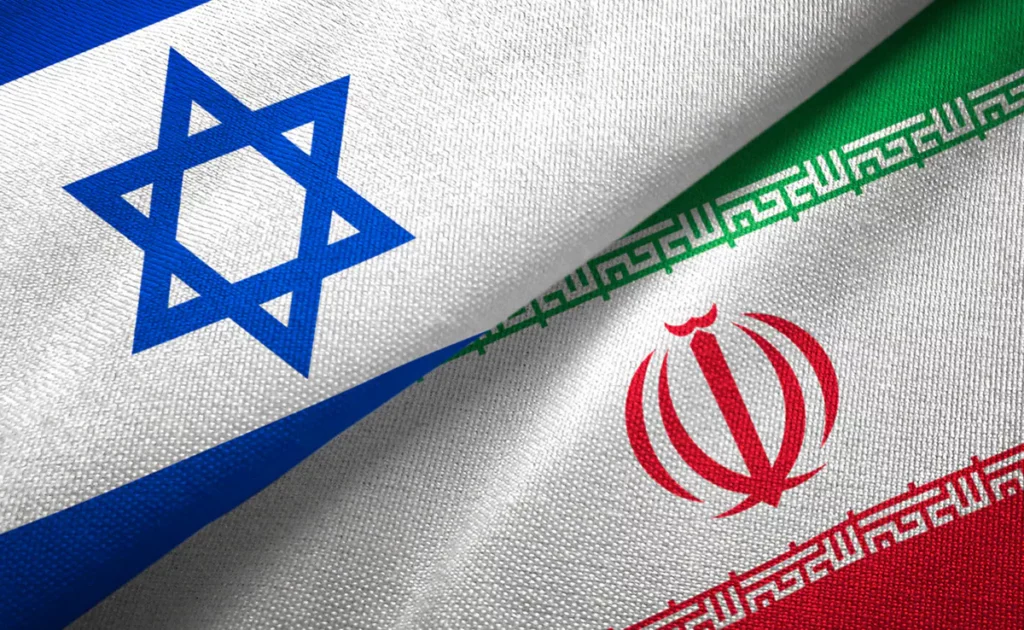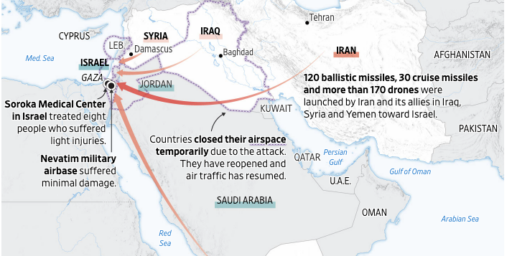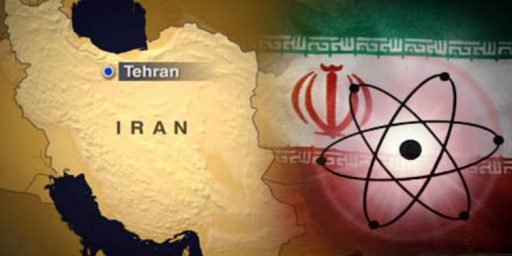Israel Launches Token Retaliatory Strike On Iran
It was the least they could do.

NPR (“Israel launches missile strikes into Iran, U.S. military official says“):
The Israeli military has conducted missile strikes against Iran, a senior U.S. military official told NPR on Thursday. There are also reports of explosions in Iraq and Syria.
The strikes appear to be the response Israel vowed to carry out after an Iranian attack on Sunday, when Tehran fired hundreds of drones and missiles at Israel. Most of Iran’s volleys were intercepted or caused little damage. The U.S. military official spoke on condition of anonymity Thursday.
Iran state news agency IRNA reported a military official in the central Iranian city of Isfahan, Brigadier General Mihan Dost, as saying loud sounds heard east of the city were the sound of air defenses intercepting what he called a “suspicious target” and that no damage was reported in the area.
Iranian news has not reported any such strike and has concluded the sounds reported near Isfahan were the interception of one or more drones. Israel’s military has not yet responded to NPR’s request for comment.
The International Atomic Energy Agency has confirmed on social media that there is no damage to Iran’s nuclear sites.
The extent of Israel’s strikes and the weapons used weren’t clear.
Meanwhile, Israel’s hardline National Security Minister, Itamar Ben-Gvir, wrote on social media platform X, formerly known as Twitter, that Israel’s latest apparent strike against Iran was “weak” and too limited.
NYT (“Live Updates: Israel Strikes Iran, but Scope of Attack Is Unclear“):
The Israeli military struck Iran early on Friday, according to two Israeli and three Iranian officials, in what appeared to be Israel’s first military response to Iran’s attack on Israel.
The Iranian officials said that a strike had hit a military air base near the city of Isfahan, in central Iran. The scale and method of the attack were unclear. And the initial reaction in both Israel and Iran was muted, with news media in both countries appearing to downplay the attack, in what analysts said was an attempt to de-escalate the situation.
[…]
- The Iranian officials said that the attack was carried out by small drones, possibly launched from inside Iran, and that its radar systems had not detected unidentified aircraft entering Iranian airspace. They said that a separate group of small drones was shot down in the region of Tabriz, roughly 500 miles north of Isfahan.
- Iranian news agencies reported that explosions were heard near both cities, adding that nuclear facilities in Isfahan had not been hit.
- In the aftermath, flight tracking websites showed that civilian planes had diverted their routes away from the area and Iranian news outlets reported that several airports had been closed. But within a few hours, Iran’s state television had broadcast footage of normal life resuming in Isfahan and Iran’s aviation agency said it was lifting flight restrictions.
[…]
The ripples in the oil market after Israel’s apparent strike were short-lived. Futures for Brent crude, the international benchmark, passed $90 a barrel but quickly fell back to about $87 a barrel as news reports indicated that the damage caused to Iran was minor and its reaction was muted.
[…]
Isfahan is one of Iran’s most famous and historic cities, known for its beautiful turquoise and purple tiled mosques, picturesque arched bridges and Grand Bazaar. The area also hosts a number of Iranian military sites.
[…]
Israeli missiles targeted air defense positions in southern Syria, according to SANA, the Syrian news agency, quoting a military source. The agency said the attack happened at 2:55 a.m. local time on Friday and caused some damage, without giving details. There was no immediate comment from Israel.
The Israeli government, quite reasonably, felt that it couldn’t not respond to Iran sending hundreds of missiles into their territory. At the same time, they were under enormous pressure not to escalate the situation further. So this is what we got: some token strikes on military facilities clearly calculated to cause minimal disruption.
One suspects this will be the end of this round of tit-for-tat.






FWIW, Israel’s violently racist National Security Minister, Itamar Ben-Gvir, has publicly decried this as “weak”. It’s an important reminder that a large part of the Israeli government wants US soldiers to fight a war with Iran on Israel’s behalf, and fully believe that if they start such a war we will have no choice but to send our troops to die there, in order to protect Israel’s apartheid regime.
It’s interesting that Iran’s government has also been frequently described as a ‘death cult’ (a very popular term these days) but for the most part they seem to be acting pretty rationally in response to events.
NY Times in a story headlined
Reports Israel also did drone probe of a military base in the middle of Isfahan in January 2023. This may be a low-grade response, but one designed to reveal defensive capabilities in this area around Iran’s nuclear development program.
How I went bed last night.
I wake up this morning and Iran and Israel are all like….
@JKB:
Which makes sense. I also have seen people (perhaps Andy here) who suggested that part of Iran’s attack was also to feel things out (in addition to the message and attempt to cause serious damange).
As with most things there are often multiple reasons that actions are taken.
@Assad K:
Completely agree. As Daniel Larison used to point out all the time when I was following his writings the idea of “suicidal governments” is a rhetorical tool rather than an actual thing.
So, the mechanics of this attack look pretty interesting. It appears (not conclusive yet) that Israel used a couple of air-launched ballistic missiles fired from jets over Syria.
The missile booster stages landed on Iraqi territory, and all the weapons geeks did a good job of identifying them and concluded that they were probably Rafael Rocks, a newer system we don’t know much about.
The target was reportedly an air defense site near an airfield near Isfahan.
So, to me, this strike was primarily about strategic messaging.
The big question is about the future – will Iran be deterred from its various aggressive actions via proxies in the region, and will Israel stop its efforts to counter that via assassination and airstrikes in Syria?
@Andy:
One part of that messaging being, the Russian air defence systems in Syria are about a sturdy as chocolate ashtray.
Also, Isfahan is one of the major centres of Iran’s nuclear weapons programme.
Likely another Israeli message: “imagine what happens there if we put a nuclear warhead in an ALBM”